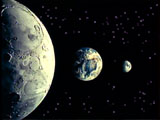
Episode Guide: Year One
Title: "Another Time, Another Place"
Within this page: Overview | Backplot | Plot Synopsis | Unanswered Questions | Analyses/Observations | Comments | Memorable Lines
Overview
The Moon returns to Earth and encounters a duplicate Moon, with a duplicate set of future Alphans. Who can stay? Who must go?
Production Number: 006 (Season One)
- filmed Tuesday, April 2 - Friday, April 19, 1974; Tuesday, April 23 - Thursday, April 25, 1974 (2nd Unit)
Original U.K. airing week: 18 December 1975 (ATV Midlands)
Original U.S. airing week: 6 February 1976 (syndication)
Written by Johnny Byrne
Directed by David Tomblin
Backplot
- In the year 1999, lunar nuclear waste storage dumps have exploded, due to magnetic radiation, sending Earth's moon into interstellar space. The inhabitants of Moonbase Alpha, unable to escape, are seeking a new home.
Plot Synopsis
(From the original ITC Press Release.)
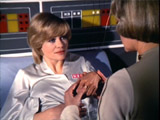 |
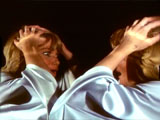 |
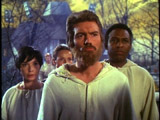 |
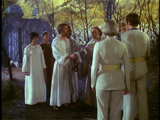 |
 |
View additional images |
An eerie phenomenon grips the moon. Moonbase Alpha Personnel become duplicated and come face to face with their future selves on Earth again. But for how long?
The mysteries of outer space take on a new and macabre development for Moonbase Alpha personnel as the moon is lashed by a terrifying disturbance which churns them into a vortex of horror. The moon, travelling at collosal speed, dissolves into a duplicate of itself, the second one then vanishing, as its inhabitants also form into double images, writhing in agony as they do so. All seem to find themselves in a totally different part of space.
The worst affected is Regina Kesslann (JUDY GEESON), of Main Mission. She is unconscious and whimpering as things appear to return to normal. Commander Koenig (MARTIN LANDAU), Helena Russell (BARBARA BAIN) and Professor Bergman (BARRY MORSE), still badly shaken, have an even greater shock when they discover they are now in a solar system and must have travelled millions of miles in a matter of seconds.
Regina's mind appears to be wandering when she returns to consciousness, murmuring about seeing two moons and the sun and that wherever she was the others were there too, but they will never come back. They are dead. Somehow, she is living in the future when the present is the past, and she is trying to warn them of something.
Whatever has happened, there is soon joy on the moon. Miraculously, they have found themselves in Earth's orbit again, with hopes of returning to Earth at last. But attempts to contact Earth are in vain. At the same time, Regina seems to have become more normal again except that she imagines she is married to Alan Carter (NICK TATE), to his complete astonishment. He hardly knows her. A little later, she dies and X-rays show that she had two separate brains.
Then the second moon is seen and is radiating Alpha's own signals. Somehow, they have caught up with themselves. Koenig and Carter set out in an Eagle to investigate, land on the duplicate moon and discover is have been evacuated except for their other selves, who are dead.
Back again at Moonbase, plans are put in hand for landing on Earth - to head back for future time. And those who go find themselves face to face with their other selves... their future selves...
SCREENPLAY BY JOHNNY BYRNE
DIRECTED BY DAVID TOMBLIN
Guest Artist
JUDY GEESON
with
PRENTIS HANCOCK as PAUL MORROW
CLIFTON JONES as DAVID KANO
ZIENIA MERTON as SANDRA BENES
ANTON PHILLIPS as DR. MATHIAS
NICK TATE as ALAN CARTER
Unanswered Questions
Analyses/Observations
Comments
- The "Main Mission: 2000" convention event (September 1-3, 2000 in New York, New York) featured a remastered version of this episode with cleaned-up visuals by Eric Bernard.
- In an interview with John K. Muir, writer/script editor Johnny Byrne discussed some insights into "Another Place, Another Time":
Muir: "But it was a fertile time for you, those early days?"
Byrne: "Oh yes. There was something deeply subconscious working all the time and none of us were aware of it. And it only happened to those of us who were there all the time, because the writing of the individual scripts was only a step in the whole process. We were in the planning of the episodes, we were seeing the dailies, day-by-day, we were working ahead and looking at new stories. We were at starship control, looking for those unidentified little blips - which were the scripts keying into something special. But the whole thing was mostly unformulated. Chris [Penfold] and I would sit in his office and have these heightened conversations about story. We were off our rockers."
Muir: "How so?"
Byrne: "I recently looked at 'Another Time, Another Place' after 20 years and I heard Bergman say that line that 'if you don't return to your moon, you'll have nowhere to die.' It made perfect sense to me when I wrote it, but now I have no idea what I was talking about. It's open to interpretation."
Muir: "How did 'Another Time, Another Place' come about?"
Byrne: "I was trying to outdo what I had done before. The Alphans have this terrifying moment that splits and separates them, they are shunted billions of miles through space, and they encounter an alternate reality Well, suddenly here is the Earth, another moon, another set of Alphans. The big moment came when they discovered the alternate base, and Carter and Koenig find themselves dead on the moon surface in a crashed Eagle."
Muir: "It's a brilliant show, and watching it you really get caught up in the sweep of it. It's very dream-like."
Byrne: "It's like the remembered fragments of a dream. The show is a dream state if you capture the moment just right. It isn't symmetrical. What we did in that story was really hold a mirror up to the Alphans, and they see themselves in a possible situation, putting two realities against each other to see how they'd shape up. 'Another Time, Another Place' was a journey into the mind. We stayed away from the whole thing of pure technology and mechanics. Of course, there were many things foisted upon us, like Regina's double brain. That was a crude image, one of those 'naff ideas that got the story into some trouble."
Muir: "Did David Tomblin [episode director] have any issues with the metaphysical aspects of "Another Time, Another Place'?"
Byrne: "None whatsoever. He said to me, 'You know, we're going to make this work.' He was given the script and made a brilliant show of it."
Memorable Lines
"I knew you didn't die. I knew." - Regina Kesslann
Copyright 1999-2003 www.Space1999.org. All Rights Reserved. Legal
notice.
This work is licensed under a Creative
Commons License, in conjunction with our Open
Source Content Model. This site uses XHTML and CSS and looks best with
a standards compliant
browser.





